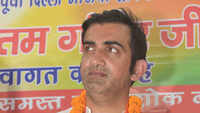
For a relatively new city, Gurgaon punches well above its weight, enough to give Delhi a complex. But while it boasts plenty of financial heft, it carries little political influence. Its MP cannot spare much time for the city, even while its civic infrastructure cries out for attention. Behind the paradox of a place with monetary muscle but without political power lies an urban disconnect in which Gurugrammers hold back from taking their grievances — largely given a miss in the election campaign — to the ballot box.
Gurgaon is a suburb on steroids,” says Deep Kalra, CEO of MakeMyTrip. Manifestly, the city has bulked up too fast, and is now having to deal with worrying side-effects. Unfortunately, those in charge don’t seem to be much troubled.
But, would a more committed representative in Parliament help by lending a voice to residents often left to fend for themselves? “In Gurgaon, the issues that concern every voter are air pollution, water pollution, lack of public healthcare and lack of universities – none have been addressed by the politicians during their campaigning,” points out Dr Himanshu Garg, a senior pulmonologist.
There are a couple of reasons behind this lack of visibility, Dr Garg adds. “First, there is a feeling among politicians that urbanites don’t vote in Gurgaon and that air pollution and other environmental concerns are always raised by the urban population. They are, therefore, not bothered to address the concerns. Second, politicians don’t realise that air pollution is a universal problem, and it affects the economically poor more.”
One reason why metropolitan Gurgaon doesn’t receive the political consideration it warrants is the percentage of urban votes here. The constituency has a total of 21.34 lakh votes, and urban votes are mostly concentrated in Gurgaon and Badshapur, which together account for 7.24 lakh votes (around 34% of overall voter share). But even this figure doesn’t comprise entirely of the urban electorate, including as it does votes in Old Gurgaon and, also, villages in Gurgaon and Badshapur.
Consequently, the total number of urban votes in the constituency, in relation to rural votes, is rather low, a detail that explains parties’ disregard towards residents of the Millennium City. On top of that, the voting percentage in urban areas is appreciably lesser than in rural areas. For instance, Nuh, one of nine assembly constituencies in the Gurgaon Lok Sabha constituency, saw a voter turnout of over 80% in the previous general elections, while Gurgaon saw a turnout of 66%. It seems quite natural, then, for candidates to gravitate towards rural voters.
MESSY PRESENT, HAZY FUTURE
Abhishek Sharma, a manager at one of the big four consulting firms, feels that Gurgaon is an urban mess. “It is bearing the brunt of growing too big too fast, (and) the basics to support the rising population are not in place. The primary reason is political neglect both by the Centre and the state,” says Sharma, a Gurgaon resident for a decade.
Key issues like air pollution, water, green cover, public transport and roads, he adds, don’t find a place in the election campaign because local leaders find it easier to reach out to the rural population, and treat it rather than the urban populace as a vote bank. “Unless we hold politicians accountable for the city’s long-term sustainable development, the future seems quite grim for Gurugrammers,” Sharma warns.
As if it’s not grim already. In March this year, Gurgaon was placed number one in a global ranking, but this was no honour to be proud of. According to data compiled by Greenpeace and AirVisual, the city was declared the world’s most polluted. That set alarm bells ringing among the Fortune 500 companies (around 250 of them), along with the more than 2,500 tech firms, who have their national HQ here – among them biggies such as Zomato, OYO, Grofers, Foodpanda, Shopclues, Rivigo and Jabong.
Most of these companies and startups face the risk of attrition due to rising pollution. Because, more and more employees are prioritising long-term health over short-term wealth. Yet, despite these warning signs, pollution hasn’t found much space in political speeches. “These issues are grave and acknowledged by policymakers. Yet, unfortunately, they don’t get the kind of attention they deserve during the all-important poll season,” worries MakeMyTrip’s Kalra, who is also a member of the board of the Gurgaon Metropolitan Development Authority (GMDA).
Ultimately, it’s left to residents to take up the responsibility. Adds Kalra, “Over the last few years, Gurgaon has seen a lot of citizen activism (on) environmental issues like air pollution, threat to green cover, poor waste management and water scarcity.”
Indeed, Gurugrammers have come out and taken up cudgels on behalf of the ecology, by protesting, for example, against the proposed amendment to the Punjab Land Preservation Act (PLPA), or the road through the Aravali Biodiversity Park. And while pollution has barely found mention in political speeches, conservation does feature in party manifestos. Newbie JJP, for one, announced that saving the Aravalis is one of its central planks, while BJP candidate Rao Inderjit Singh promised “resolute efforts” towards saving the environment, while ensuring that aquifer areas are not encroached upon.
“Gurgaon is a global city and requires proper planning – we cannot have a city of this scale without lungs. We need to look at cities like London and ensure maximum possible green cover,” maintains Mahmood Khan, the JJP candidate from Gurgaon, adding, “However, unfortunately, my political counterparts are only interested in the power game and not the future of children or the safety of women in the city.”
City-based greens agree, while expressing shock and disbelief that candidates have chosen to remain silent on pollution and the environment. “The government is going back and forth on many environmental issues. While local leaders have spoken publicly against the biodiversity park and the PLPA, they haven’t yet pulled back (on) either of the two. This shows the doublespeak of the political class on environmental issues,” argues Chetan Agarwal, a city-based environmental analyst.
GURGAON DOES MATTER
(JUST NOT NATIONALLY)
(JUST NOT NATIONALLY)
Political neglect, however, isn’t restricted to just the environment. It holds true for infrastructure as well. While incumbent MP Rao Inderjit Singh has listed GMDA as a personal achievement, there are too many delayed or pending infra projects holding up Gurgaon, especially in the new sectors in the south of the city. Hanging fire is the completion of the Dwarka Expressway, and the removal of the toll plaza at Kherki Daula, neither finding reference in any manifesto or politician’s address.
Clearly, the lack of basic infrastructure is a bane for the many living in these areas. Meetu Satya, a housewife residing in Sector 90, fumes that no one is talking about pollution. “It is very surprising that no political party or candidate is talking about safety and security in New Gurgaon, where thousands of women commute daily for their jobs, where there is no police station in the vicinity, and moreover no public transport is available,” laments Satya.
Not surprisingly, none of the candidates has bothered to engage with those living this side of the city. “New sector residents do not exist for the political parties or the government – we are victims of utter neglect. There was not a single political campaign done in this part of the city in the current Lok Sabha elections,” complains Shibhashish Rudra, a resident of sector 80.
Rao Inderjit, however, rejects any basis for discontent. “I had promised the formation of GMDA during my previous poll pitch and I ensured that the authority was formed for the city’s development. With respect to the environment, I had gone against the Haryana government to say that the PLPA amendment must not be approved by the cabinet,” he insisted.
Indeed, he can count GMDA as one of his successes, but the authority has largely failed to put a brake on the city’s haphazard growth. Meanwhile, officials within GMDA accept that it is struggling to meet the expectations of the government, amid a financial crunch and lack of human resources.
In such a scenario, the only hope for Gurgaon’s residents is the assembly election slated for later this year. Then, local and hyperlocal issues are more likely to be discussed and deliberated. Disenchanted by a ragtag and apathetic city administration, Gurugrammers certainly deserve better, including a government (and an MP) that endeavours to give Gurgaon a quality of life that’s befitting of its ‘Millennium City’ moniker.
#ElectionsWithTimes
Quick Links
Lok Sabha Election Schedule 2019Lok Sabha Election NewsDelhi Capitals teamMI team 2019Rajasthan Royals 2019RCB team 2019Maharashtra Lok Sabha ConstituenciesBJP Candidate ListBJP List 2019 TamilnaduShiv Sena List 2019AP BJP List 2019Mamata BanerjeeBJP List 2019 MaharashtraPriyanka GandhiBJP List 2019 KarnatakaAMMK Candidate List 2019BJP List 2019 WBLok Sabha Elections in Tamil NaduBSP List 2019 UPNews in TamilLok Sabha Poll 2019Satta Matka 2018PM ModiMahagathbandhanNagpur BJP Candidate ListChandrababu NaiduTamil Nadu ElectionsUrmila MatondkarNews in TeluguMadras High CourtTejashwi YadavArvind KejriwalTejasvi SuryaPawan KalyanArvind KejriwalYogi AdityanathJaya PradaSatta King 2019Srinagar encounter
Get the app









